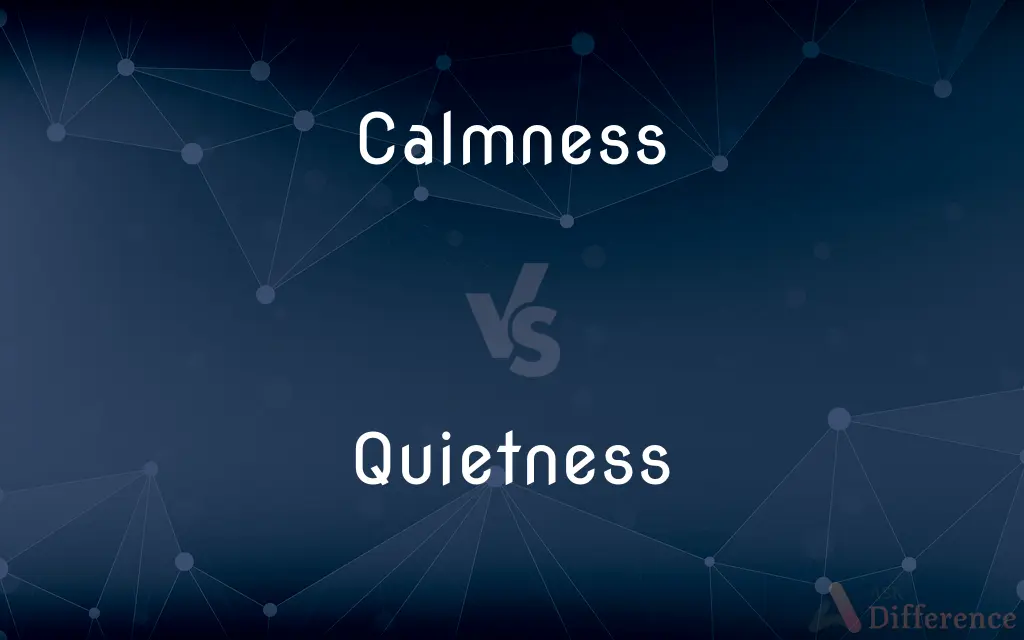Calmness vs. Quietness — What's the Difference?
By Fiza Rafique & Maham Liaqat — Updated on April 25, 2024
Calmness is a state of emotional tranquility and mental stillness, whereas quietness refers to the absence of noise or low noise levels.

Difference Between Calmness and Quietness
Table of Contents
ADVERTISEMENT
Key Differences
Calmness is primarily about internal peace and emotional stability, often reflective of a person’s mental state. Quietness, on the other hand, deals with the external environment, specifically the absence or minimal presence of sound.
Calmness helps individuals manage stress and maintain clarity in decision-making, providing emotional and psychological benefits. Quietness, however, is more about creating a conducive atmosphere for activities that require concentration, such as reading or meditating.
While calmness is a personal experience that can occur even in noisy environments, quietness is a condition of the surroundings that can be measured and quantified.
People often seek calmness through techniques like meditation or yoga, which focus on controlling one's thoughts and emotions. Whereas, quietness might be achieved through physical changes such as soundproofing or choosing a quiet location.
Calmness is often seen as a desirable trait in individuals, indicating a level of emotional maturity and control. Quietness is typically valued in specific settings like libraries, schools, or workplaces where noise is a distraction.
ADVERTISEMENT
Comparison Chart
Definition
State of being mentally and emotionally peaceful
State of being silent or having little to no sound
Primary Focus
Emotional and mental state
External environment
Benefits
Reduces stress, enhances clarity
Reduces distractions, aids concentration
Techniques Involved
Meditation, deep breathing exercises
Soundproofing, choosing quiet locations
Desirability
Valued as personal trait
Valued in specific contexts or environments
Compare with Definitions
Calmness
Serenity.
The calmness of the lake at dawn was breathtaking.
Quietness
Hush.
The library's enforced quietness helped him focus.
Calmness
Tranquility.
He found calmness in the quiet of the countryside.
Quietness
Silence.
The quietness of the room was ideal for studying.
Calmness
Composure.
Despite the chaos, her calmness was remarkable.
Quietness
Stillness.
The forest's quietness was both eerie and beautiful.
Calmness
Peacefulness.
Meditation brings a sense of calmness to her mind.
Quietness
Noiselessness.
The quietness of the electric car was impressive.
Calmness
Stillness.
His calmness during the storm reassured everyone.
Quietness
Serenity.
Early mornings in the garden are filled with a peaceful quietness.
Calmness
Calmness is the mental state of peace of mind being free from agitation, excitement, or disturbance. It also refers being in a state of serenity, tranquillity, or peace.
Quietness
Making or characterized by little or no noise
A quiet library.
A quiet street.
A quiet, well tuned engine.
Calmness
Nearly or completely motionless; undisturbed
The calm surface of the lake.
Quietness
Free of turmoil and agitation; calm
A quiet lake.
A quiet place in the country.
Calmness
Not excited or agitated; composed
The president was calm throughout the global crisis.
Quietness
Providing or allowing relaxation; restful; soothing
A quiet afternoon nap.
A quiet tune on the flute.
Calmness
An absence or cessation of motion; stillness.
Quietness
Not showy or bright; subdued
A room decorated in quiet colors.
Calmness
A condition of no wind or a wind with a speed of less than 1 knot (1.15 miles per hour; 1.9 kilometers per hour), according to the Beaufort scale.
Quietness
Restrained, as in style; understated
A quiet strength.
A quiet life.
Calmness
Tranquility or serenity
"an unaccustomed reticence that I took to be the calm that follows rage" (Jeanne Marie Laskas).
Quietness
Out of public scrutiny; known or discussed by few
Wanted to keep the incident quiet until after the election.
Calmness
To make or become calm or quiet
A warm bath will calm you. After the storm, the air calmed.
Quietness
The quality or condition of being quiet
"A menacing quiet fills the empty streets" (Time).
Calmness
(uncountable) The state of being calm; tranquillity; silence.
Quietness
To cause to become quiet
The teacher quieted the students.
Calmness
(countable) The product of being calm.
Quietness
To make (a title) secure by freeing from uncertainties or adverse claims as to the ownership.
Calmness
The state of quality of being calm; quietness; tranquillity; self-repose.
The gentle calmness of the flood.
Hes calmness was the repose of conscious power.
Quietness
To become quiet
The child wouldn't quiet down for me.
Calmness
Steadiness of mind under stress;
He accepted their problems with composure and she with equanimity
Quietness
Absence of sound; silence or hush.
Calmness
An absence of strong winds or rain
Quietness
Absence of disturbance; calm, stillness or serenity.
Calmness
A feeling of calm; an absence of agitation or excitement
Quietness
The quality or state of being quiet; freedom from noise, agitation, disturbance, or excitement; stillness; tranquillity; calmness.
I would have peace and quietness.
Quietness
The property of making no sound
Quietness
A state of peace and quiet
Common Curiosities
What is quietness?
Quietness refers to a lack of noise or very low noise levels in the environment.
Why is quietness important?
Quietness is important as it helps reduce distractions and facilitates activities that require focus and concentration.
Can someone be calm in a noisy environment?
Yes, calmness depends on an individual's mental state and can be maintained despite external noise.
How can calmness be achieved?
Calmness can be achieved through meditation, yoga, and other stress-relief practices.
Can quietness be too much?
Excessive quietness can sometimes feel isolating or unsettling to some people.
Is calmness a skill?
Yes, maintaining calmness can be developed as a skill through regular practice.
Can quietness help with sleep?
Yes, a quiet environment is conducive to better sleep quality.
What is calmness?
Calmness is a state of internal peace and emotional stability.
How do calmness and quietness impact health?
Both can positively impact mental health, reducing stress and promoting relaxation.
How do cultures view calmness and quietness?
Different cultures may emphasize one over the other in various aspects of life.
Does quietness affect calmness?
While quietness can support achieving calmness, it is not a necessary condition as calmness is an internal state.
What are the signs of a calm person?
Signs include steady breathing, relaxed body language, and a composed demeanor.
What psychological effects does calmness have?
It typically reduces anxiety, enhances mood, and improves overall emotional resilience.
What environments benefit most from quietness?
Libraries, classrooms, and workspaces benefit greatly from quietness.
What tools help create quietness?
Soundproofing materials and noise-canceling headphones are effective tools.
Share Your Discovery

Previous Comparison
Explorer vs. Tourist
Next Comparison
Hangout vs. DateAuthor Spotlight
Written by
Fiza RafiqueFiza Rafique is a skilled content writer at AskDifference.com, where she meticulously refines and enhances written pieces. Drawing from her vast editorial expertise, Fiza ensures clarity, accuracy, and precision in every article. Passionate about language, she continually seeks to elevate the quality of content for readers worldwide.
Co-written by
Maham Liaqat













































